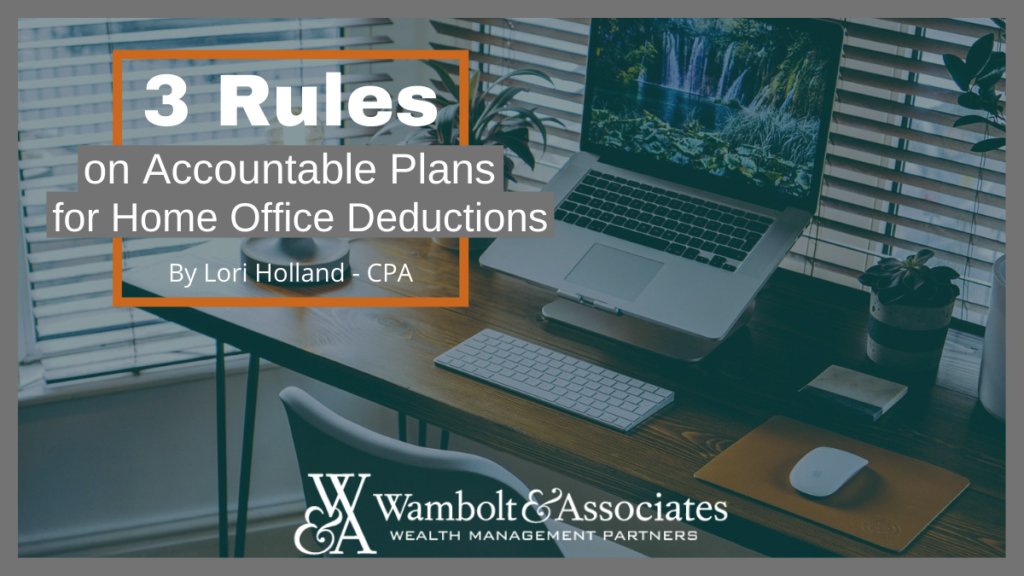How to implement tax-free benefits for employees working from home.
During Covid-19, companies small and large were forced to adapt to remote work. Workers and businesses invested in home offices and equipment. Now, a growing number of companies are realizing that full remote or hybrid work weeks are here to stay as more employees do not want to return to the daily commutes to an office. In addition, many employees report that they enjoy the benefits of working from home, such as money saved on gas, better work-life balance, more time with family, and reduced chances of getting sick. At the same time, employers realize that employees can be productive and focused when they are not in the office and possibly even more so when working at home.
How do employers and employees handle the costs of providing a home office to remote workers?
The Tax Cuts and Jobs Act (TCJA) passed in 2017 redefined the deductibility of business expenses; specifically, W-2 employees were no longer able to deduct unreimbursed business or job-related expenses as miscellaneous itemized deductions on their personal tax returns. In laypeople’s terms, W-2 employees cannot deduct the cost of a home office on their personal tax return, even if their employer requires a home office. This provision of the TCJA tax law will be in effect until 2026 unless Congress votes to extend it. These changes included S Corporations owners who also serve as employees in their companies.
As with many tax law changes, accountants have found a way to minimize the tax effect through the accountable plan. An accountable plan is a reimbursement program implemented by the employer to reimburse employees for business expenses they incur as part of the job, including home office expenses. The plan is simply a set of guidelines that outline how a company will reimburse expenses and which expenses qualify for reimbursement. When using an accountable plan, business expenses are reimbursed to the employee and are not considered compensation, thus providing a tax-free benefit to employees while the business is allowed a deduction for the business expenses. This includes S Corporation owner-employees.
There are three standards or rules for implementing an Accountable Plan
- Expenses must have a business connection.
- Adequate accounting of expenses.
- Any excess advances to the employee must be timely repaid.
If any of these standards are not met, the plan is considered nonaccountable, and reimbursements become taxable compensation to the employee.
Ultimately, setting up an accountable plan is straightforward and is a simple model of claiming and documenting businesses expenses incurred by employees. The reimbursement is not taxable to the employee, and the employer is able to take a tax deduction.
Tax rules do not require that an accountable plan is in writing. However, it is recommended that companies put a plan in writing to make it clear and useable for both the employer and the employee and to outline the three standards above.
Rule #1 – Expenses Must Have a Business Connection
To have a business connection and before reimbursement is made, the employer must authorize the purchase that meets the definition of a legitimate business purpose, including:
- Travel
- Gas/Mileage expense
- Home office expenses
- Cell phone
- Internet
- Training, development
- Dues, subscriptions, professional licenses
These expenses must be paid or incurred by the employee while performing services for the company. Home office expenses can include a portion of the home’s mortgage interest, real estate taxes, utilities, home insurance, or rent. It can also include desks, monitors, internet service upgrades, painting or repairs to a home office. A reasonable method for determining home office expenses to be reimbursed is to apportion expenses by dividing the square footage of the home office by the total square footage of the home.
Rule #2 – Adequate Accounting of Expenses
Adequate accounting of expenses means that employees must account to their employer for expenses within a reasonable period of time (i.e., 60 days of when expenses were paid or incurred). This can be an expense report, trip sheet, or log, provided within a reasonable period after the expenses were paid or incurred. Documentation should show:
- Amount and business purpose for the expense.
- Time and place of any travel.
- Date and description of any business gifts, including the business relationship.
Rule #3 – Refunding Excess Reimbursements
Employees who advance funds to cover expenses must return to the employer any excess amounts. (i.e., 120 days of when funds are advanced).
The IRS allows a ‘reasonable period’ guideline for both the accounting of expenses and the refunding of excess reimbursements. IRS Safe harbor rules are 60 days for accounting of expenses and 120 days for excess reimbursements.
Under the current tax rules, accountable plans are beneficial to employees with unreimbursed business expenses and to their employers. It is a mechanism to incentivize employees and to facilitate employer-owners’ deductions of expenses they incur while pursuing business goals.
No matter what tax situations you, your business, or your family face this year, our team is always happy to help and make recommendations. In addition, we can use our in-house CPA to consult on your tax situation or work with your tax advisor to find the best pro-active tax solutions for your financial circumstances. We are happy to provide templates for accountable plan documents if you are interested in speaking with any of our team members about how an accountable plan can work for your business.


